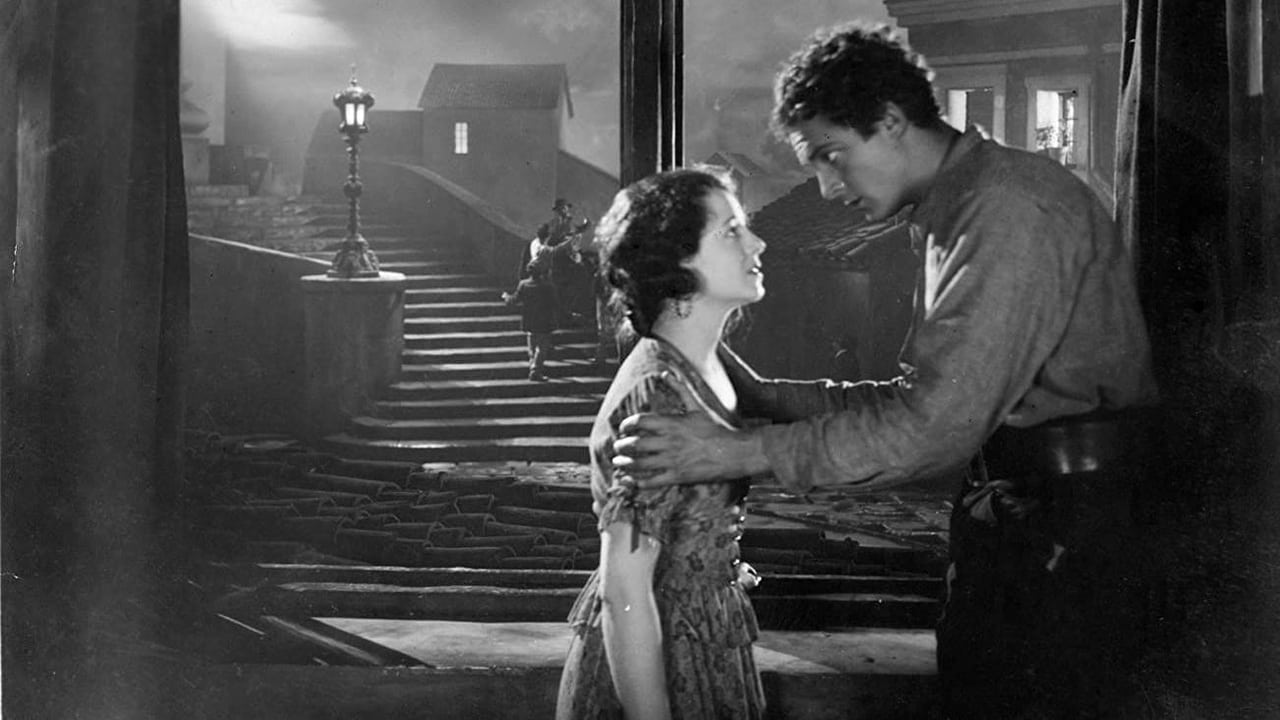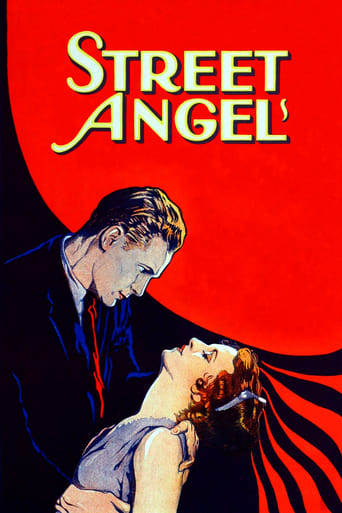

With her ailing mother in need of medicine, pretty poverty-stricken Janet Gaynor (Angela) desperately decides to sell herself for sex on the streets of Naples, Italy. Unable to attract any interested male customers, the innocent-looking Ms. Gaynor steals some money instead. Gaynor is caught, and convicted of "robbery while soliciting." As she is led to serve her year in the workhouse, Gaynor escapes and joins the circus. A leggy attraction, she leaves upon meeting handsome painter Charles Farrell (as Gino). The couple are planning to be married when Gaynor's past threatens to end their happiness Happiness is foreplay when Gaynor caresses Farrell's feet; in a startling scene, they are the symbols of fertility "Street Angel" is the lesser known of the three films for which Gaynor won her "Best Actress" Oscar, and it is often mentioned as being the film in which the sweet, wholesome actress played a prostitute. After seeing the film, it's clear she is never really a prostitute; this story, like others from the silent era, makes the prostitutes very clear (without showing any sex), and Gaynor's character is not one of them (you could call her a failed prostitute). Also surprisingly (or not, if you've seen it), this performance by Gaynor is worthy of a "Best Actress" nomination on its own, as was "7th Heaven" The song sounding like Elvis Presley's "It's Now or Never" is the beautiful Italian standard "O Sole Mio" Frank Borzage, who won the first "Academy Award" as "Best Director" for his "7th Heaven" (also with Gaynor and Farrell) could have won for this film. It may not be up to Frank Murnau's "Sunrise" levels, but "Street Angel" is still extraordinarily beautiful. The photography by Ernest Palmer and Paul Ivano, along with the settings by Harry Oliver also received award attention (outside of its initial eligibility year). You'll see why. The only thing keeping "Street Angel" from perfect is the rather too ordinary, overused storyline; moreover, its celebration of virginity is taken to pretentious extremes.********* Street Angel (4/8/28) Frank Borzage ~ Janet Gaynor, Charles Farrell, Alberto Rabagliati, Natalie Kingston
... View MoreIt's a moody and often expressionistic film like Gaynor's "Sunrise" (1927)...which I consider far superior in technique and story. Two things I find VERY DISTURBING about "Street Angel" --(1) She asks the cop for 'one little hour' with her fiancé' before going to jail, but she went to jail right after her mom died without burying her or explaining to the cops or the judge. (2) She does not explain to her fiancé' why she's going away and, after she gets out, does not try and explain either. For this reason, I do not find Gaynor's character very appealing or sympathetic at all. She's definitely no "angel" in this movie. I feel sorry for the painter guy. The film's only redeeming qualities are the scenes inside their apartment which are tenderly and exquisite.
... View MoreJanet Gaynor stars as the "street angel," a euphemism for prostitute, in this lushly romantic silent film. Of course Gaynor is really not a woman of the streets, but is convicted up this crime and stealing money from a lunch counter, which she does out of desperation to save her sick mother. She escapes the police however and hides out with a traveling circus. She becomes part of the troupe and meets a vagabond artist (Charles Farrell) and falls in love.His love for her inspires him to create a great painting of her. This art gets him a muralist job with the city. On the verge of marriage, the police find her and take her to prison. Farrell doesn't know what's happened to her and his life is destroyed until a chance meeting on the foggy shores of Naples.Janet Gaynor is superb as the street angel, quite able to show passion despite her youth and she looks great. Charles Farrell is OK as the artist. Henry Armetta is one of the circus performers, and Natalie Kingston is the mean prostitute.Director Frank Borzage creates a great city set amidst fog and shadows. This setting is used to great effect in the several chase scenes. The set design and cinematography earned Oscar nominations, and this is one of three films (with Sunrise and Seventh Heaven) for which Gaynor won the very first Oscar as best lead actress (beating out Gloria Swanson and Louise Dresser).Gaynor achieved stardom at the end of the silent era but easily made the transition to sound and had a solid career through the late 30s. She is best remembered as the star of the original A Star Is Born in 1937.
... View MoreMelodramatic, atmospheric romance with some great tracking shots that look like they influenced Scorsese decades later. Gaynor and Farrell, are extraordinarily well used; this film probably epitomises their appeal better than any other. He's all youthful exuberance, and she's all liquid-eyed yearning. The print I saw had a musical soundtrack with sound effects -- very soupy, but for a take-it-or-leave-it love story like this, just right.
... View More